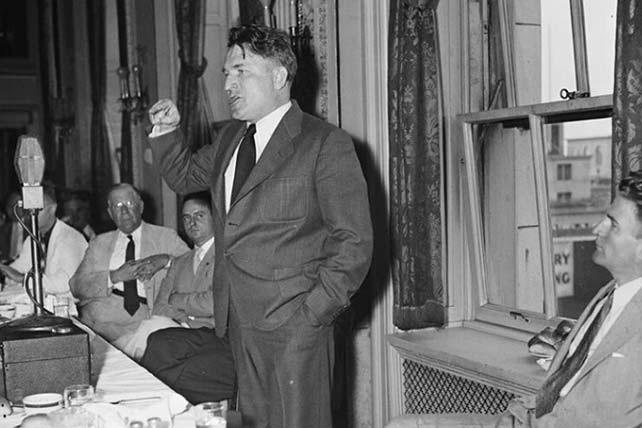The two men eventually helped launched a third-party challenge to Franklin Delano Roosevelt in 1936, promising to save the country from both the communists and Roosevelt’s big-money backers. At a convention organized by Coughlin’s National Union for Social Justice, Smith stood with a Bible in hand and gave a three-hour speech, promising to defend the Constitution, the Bible, Santa Claus and the Easter Bunny.
Like some modern Christian nationalists, Smith was both true believer and grifter, eager to promote his beliefs and build up his personal power, said Seth Cotlar, professor of history at Willamette University. Smith and other Christian nationalists also promoted “participatory anti-democracy,” said Cotlar, quoting a phrase coined by Princeton scholar Joseph Fronczak.
They were skilled, he said, at “getting people really fired up and mobilized in the name of fighting against democracy.”
Painting secular democracy as the enemy of Christianity, said Cotlar, Christian nationalists like Smith argued that the only patriotic way to save America from godless secularists was to vote for leaders who would ignore the rules of democracy. “It sounds really counterintuitive,” said Cotlar. “But it works if you perceive that the American democratic tradition is a tradition that hates you. It gives people a real sense of purpose and mission.”
Whitehead said political power has become an idol for modern Christian nationalists as well, one that can be used to justify anti-democratic action. Faith can then fuel that action.
“If a group legitimate their goals in the will of transcendent God, then what could stand in their way? The answer is nothing, not even democracy,” said Whitehead, whose new book, due out this fall, is titled “American Idolatry: How Christian Nationalism Betrays the Gospel and Threatens the Church.”
While Smith failed to gain political power and faded from memory, his ideas did not. Cotlar said he sees echoes of Smith in the current cultural debates over “wokeness” and the “deep state.”
Martin, author of “The Gospel of J. Edgar Hoover,” said he also saw echoes of historic Christian nationalism in the Jan. 6 attack on the Capitol, something he believes the congressional investigation into the attack missed. “The Jan. 6 report … seems to want to lay almost all the blame on the president and not really take seriously the virus in the body politics that is Christian nationalism,” he said.
He said the committee investigating the attack dismissed the Proud Boys and other right-wing groups as fringe groups, not focusing on how much they represent ideas of Christian nationalism that remain in mainstream culture.
When Smith died in 1976, the Arkansas Gazette summed up his life this way, according to his biographer: “To have the power to touch men’s hearts with glory or bigotry and to choose the latter is a saddening thing.”
He had split much of his later years between California, where he ran a nonprofit called the Christian Nationalist Crusade, and Eureka Springs, Arkansas, where he built a series of Christian tourist attractions, including a Passion Play, a Holy Land Tour and a 65-foot-tall Jesus called “Christ of the Ozarks” on top of a mountain. The statue, made of concrete, was designed by the same sculptor who built a giant brontosaurus for Wall Drug, the famed South Dakota tourist attraction.
These monuments now seem quaint, of another age. But his legacy as a Christian nationalist seems more vibrant than ever.
(This story was was reported with support from the Stiefel Freethought Foundation.)
This article originally appeared here.

